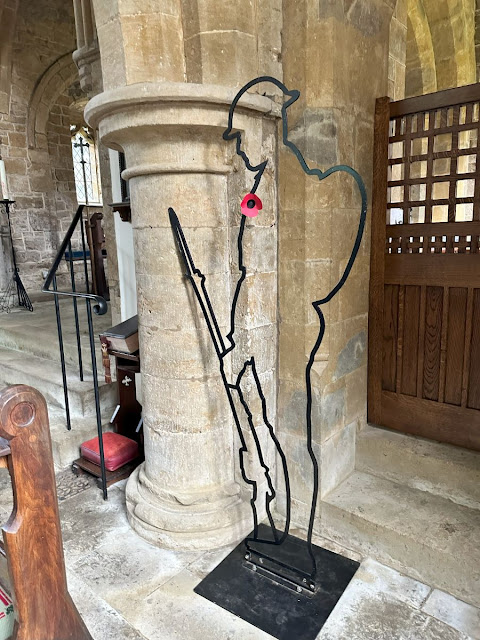For a while I have been deliberating how to go about visiting St Michael & All Angels Alkerton as it was one of the five churches I wanted to visit around Banbury as it happend my son had to visit the Horton Hospital for a scan which I knew would take around an hour or so. After a quick look at the map and using the route finder on Google maps it turned out the place was around 15 mins away so enough time for a visit. It worked out well and I though I had time to go to the next church but my son phoned so it was pick up time. I did get to visit a second church with him which I will be showing next week.
"The oldest parts of the Church of England parish church of St Michael and All Angels are the lower stages of the central bell tower, which date from the 12th century in the Transitional style between Norman and Early English Gothic. Towards the end of the 12th century the south aisle was added, linked with the nave by an Early English Gothic arcade of two bays. Early in the 13th century the east and west arches of the central tower were replaced with Early English Gothic ones. A stone effigy of a knight in an early 13th-century style was presumably added about the same time.
Early in the 14th century the upper stages of the bell tower were built and the nave was rebuilt. Late in the 14th century a clerestory was added to the nave. The exterior of the clerestory is elaborately decorated with figures of men and animals carved from Hornton stone. The style of carving belongs to a school of 14th century north Oxfordshire masons whose work survives also at Adderbury, Bloxham and Hanwell.
Early in the 17th century the rector, the mathematician Thomas Lydiat, had the chancel rebuilt in the Perpendicular Gothic style. In 1889 the architect JA Cossins restored the church building and added an organ chamber south of the tower and east of the south aisle. St Michael's is now a Grade I listed building. The tower has a chime of four bells but they are not currently ringable. The oldest bell was cast in about 1400 and another was cast in 1618. St Michael's is now one of eight ecclesiastical parishes in the Ironstone Benefice"
Like a lot of the churches build in the area it features that beautiful colored stone
North side
around the the north west
finally the west end
Doors and windows
This may have been a mass dial
I noticed this water spout as I was leaving, it's just a shoot on the other side of the church
After I took the photo of these two headstones by the back I checked the dates
The words still readable and the date is 166?
Not quite as old but 1715
and this one 1725
Looking south of the church
Up by the east end of the church
North of the church is another part of the churchyard
Along the west end
Over by the porch
The caring still there but the words long eroded
The porch leading in
First look as you walk in the church
The nave to the chancel arch
The chancel arch looking through the cross over under the tower
In the cross over a choir
Inside the chancel
The altar just a simple table
Looking back down the cross over to the nave
Through the nave to the back
The pulpit, behind you can see a door that would have you up stares to the opening you see above it coming out in the rood loft
Another view of the pulpit
The view from the pulpit
Pillars ether side of the chancel arch
In the chancel the effigy of a knight which is well worn away and a memorial
Couple more memorials you will see in the church
The windows, I noticed the corbels when I looked at the photo later
Cropping the photo gives a better idea. Normally I would have used my zoom lens but forgot
West window
South aisle
Out line of a solder who did not return
Behind the screen is this small chapel with altar
Again a simple table
South to north through the cross over
At the back of the south aisle is the font which looks to be Norman
Final view through the church
Till next time may I wish you all a peaceful week

















































5 comments:
That sculpture of the soldier moved me deeply, Billy. This is a simple, yet beautiful church. Thanks for sharing with us. Blessings!
What lovely architecture and I love the mellow colour of the stone used. Some early gravestones have survived.
What a solid building! I’m amazed at how much you got done in a short time.
I love the look of that colored stone. It's a very striking church.
Thank you for sharing at http://image-in-ing.blogspot.com/2025/03/more-floral-fantasies-philly-flower-show.html
Such great pictures of a beautiful building. Thank you for sharing and for taking part with #MySundaySnapshot.
Post a Comment